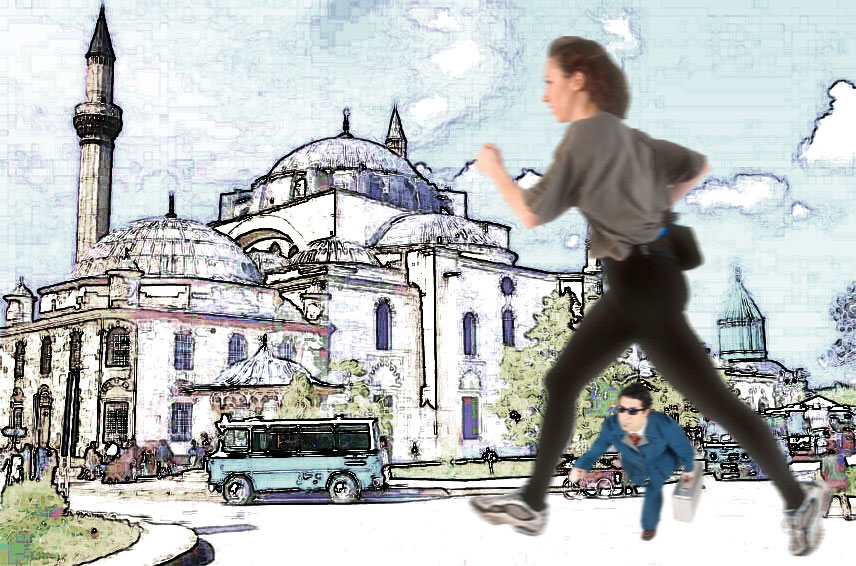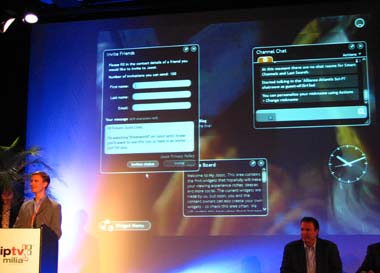Originally published Oct 2011 in Wired Magazine ‘Change Accelerators‘ by Gary Hayes 2 of 5
The alarm rings. Get out of bed, have a shower, dress, breakfast, grab your briefcase, and bus ticket and out the door. Now start RUNNING! Zombies are chasing you. Or is it pirates? Or the Mafia? Games and stories have grown legs and Facebook MafiaWars and Playstation console games have jumped into the physical world. Welcome to the most exciting and entertaining commute of your life.
For the first time in technological history portable devices that are able to send and receive game/video media, are now location aware. This means big changes in where we experience our stories. They will be always on. Around the next corner. We will be living inside the story world.
To get a glimpse of future services in the locative, pervasive space we simply need to look at the now and extrapolate.
As kids we all loved playground games: Hide and seek, capture the flag, cowboys and Indians captivated our imaginations and it was an important part of our social development. Today adults use technology to recreate those experiences for real using our own imaginary, place-based Holodecks. Fulfilling some of our adult needs in this space, The Go Game for example advertises itself as “the future of corporate play,” team-building, and self discovery.
Beyond mapping, check-in utility, or GPS functionality, what kinds of story game and locative services will get millions off their behinds and out into the real world? It takes a lot to commit to wandering around, scavenger hunting for morsels of story. How in the future may locative gamesevolve into being mass media? Or are they really just for niche groups?
This is and has moved way out of niche already. Early locative entertainment, such as orienteering and geocaching (user-created capsules hunt) are still played regularly by five million globally. More story-driven, first-generation Alternate Reality Games with locative elements such as Gentrificationor I Love Bees, attracted several million players. LBS, or locative-based services, have radicallyaltered the social gaming landscape already in Asia for hundreds of millions. A recent Pew mobile report noted that more than half of all smartphones are used for social and utility locative services and by 2015 it will be a $21 billion industry.
What makes and will make these so compelling, to so many?
1 PLACE
The stories and games contextually fit their surroundings. The origins of this genre have often been based on architecture, audio tours, and urban map layouts, using early wearable computers or earphones. For example, back in 2004 PacManhattan re-created the 1980s game around Central Park’s grid-like streets and had hundreds of players running around collecting virtual dots. The creators wanted to:
“explore what happens when games are removed from their ‘little world’ of tabletops, televisions and computers and placed in the larger ‘real world’ of street corners, and cities.”
2 STORY
This element can put you and your friends at the center of the action. For example, “Spy Am I” a massive multiplayer locative game, lets players be the secret agent, or live the life of a criminal. There are many story based pervasive game apps being launched on GPS enabled smartphones that let you explore your darker side such as Crime is Life or Crime Plays.
For those who want to make their real world a little bit more terrifying than it already is we have social locative games such as Zombie Apocalypse, where you have to really run, to outrun the attacking man eaters.
Speaking of running, marketers are not far behind in this race with viral examples such as Nike Grid or Mini’s Getaway (“this game has united us, it is so social”) that combined the best formula of story, game, and exercise with lots of social locative strategy.
Our locative experience tools are powerful social organizers. Everything in our future lives will be geo-tagged.
3 SOCIETY
Set in the physical world means the same tools available to storytellers and marketers are available to everybody, including activists. So the recent Occupy Wall Street meet-ups themselves begin to look like locative fiction. Hundreds of thousands of geo-tagged narratives create probably the world’s most connected locative story yet. In a similar story-world, but oddly similar in focus, Tourality and Shadow Cities get you and your friends to battle, find treasure, and lay claim to areas of the city.
Flash mobs are a form of locative storytelling, a sort of organized social Holodeck. The social unification that comes from the best of these choreographed events, beginning with Frozen Grand Central, spread around the world. They become memes copied and extended through global imitation.
The story future of this specialized entertainment format is likely to come from expert traditional cinematic and marketing storytellers. They will be experimenting and extending fictional narratives into geo space. Pandemic 1.0 by Lance Weiler & Seize the Media is an infected world extending plot lines and challenges from cinematic games three years earlier. A present day example of future locative story, this played at the Sundance Film Festival and involved the best aspects of team play, discovery, and clever use of multi-device and place.
The popularity of locative stories and games will be proportional to marketers and writers making it worth our while to ask for our stories-to-go. As the technology matures and location lock-on is instantaneous, it will truly take off. The technology already fits in with our existing out of home routines, particularly when it comes to commenting, working, eating, and entertainment.
But back home, watching a forensic cop show on the TV. At the end, you’re told to go out of the house and help track down the killer on the street, mobile locative device in hand!
What are the security implications of this? In one evening, 200,000 viewers turn into 200,000 private eyes on the streets of London?! Would you take part in these types of services?
But think, at the end of the day, as the sun sets in a dark backstreet in your hometown, your heart starts pounding again. Will you make it back home alive?
Consider yourself, entertained.



Stories-To-Go. Locative Entertainment Futures – Beyond 2012 Wired t.co/rSCrWdjc
Stories-To-Go. Locative Entertainment Futures – Beyond 2012 Wired t.co/rSCrWdjc
Stories-To-Go. Locative Entertainment Futures – Beyond 2012 Wired t.co/rSCrWdjc
Stories-To-Go. Locative Entertainment Futures – Beyond 2012 Wired t.co/rSCrWdjc
From the ever great Gary Hayes…RT @garyphayes: Stories-To-Go. Locative Entertainment Futures – Beyond 2012 Wired t.co/HvfKXEmt
RT @garyphayes: Stories-To-Go. Locative Entertainment Futures – Beyond 2012 Wired t.co/AXaTwGER
It took more time than I expected for these to arrive: Stories-To-Go. Locative Entertainment Futures – Beyond 2012. t.co/6nxv6utG #in
RT @garyphayes: Stories-To-Go. Locative Entertainment Futures – Beyond 2012 Wired t.co/WrHRfDwQ
RT @garyphayes: Stories-To-Go. Locative Entertainment Futures – Beyond 2012 Wired t.co/5HSWnb7L
RT @garyphayes: Stories-To-Go. Locative Entertainment Futures – Beyond 2012 Wired t.co/geMA84Ir
RT @garyphayes: Stories-To-Go. Locative Entertainment Futures – Beyond 2012 Wired t.co/VECCuTS1
RT @garyphayes Stories-To-Go. Locative Entertainment Futures t.co/2mb3n1fo
Stories-To-Go. Locative Entertainment Futures – Beyond 2012 Wired | PERSONALIZE MEDIA t.co/QCRYkLu2
RT @garyphayes Stories-To-Go. Locative Entertainment Futures – Beyond 2012 Wired | PERSONALIZE MEDIA t.co/wQZI3hos
Archive: : Stories-To-Go. Locative Entertainment Futures – Beyond 2012 Wired t.co/E0CPNV3q
Archive: : Stories-To-Go. Locative Entertainment Futures – Beyond 2012 Wired t.co/E0CPNV3q
Archive: : Stories-To-Go. Locative Entertainment Futures – Beyond 2012 Wired t.co/E0CPNV3q
Archive: : Stories-To-Go. Locative Entertainment Futures – Beyond 2012 Wired t.co/E0CPNV3q